Exclusive: For Some, Russiagate Never Ended
Longtime Trump adviser Michael Caputo's life was upended by Russiagate. Under Biden, he and others were spied on a second time. On the scandal's unreported second chapter
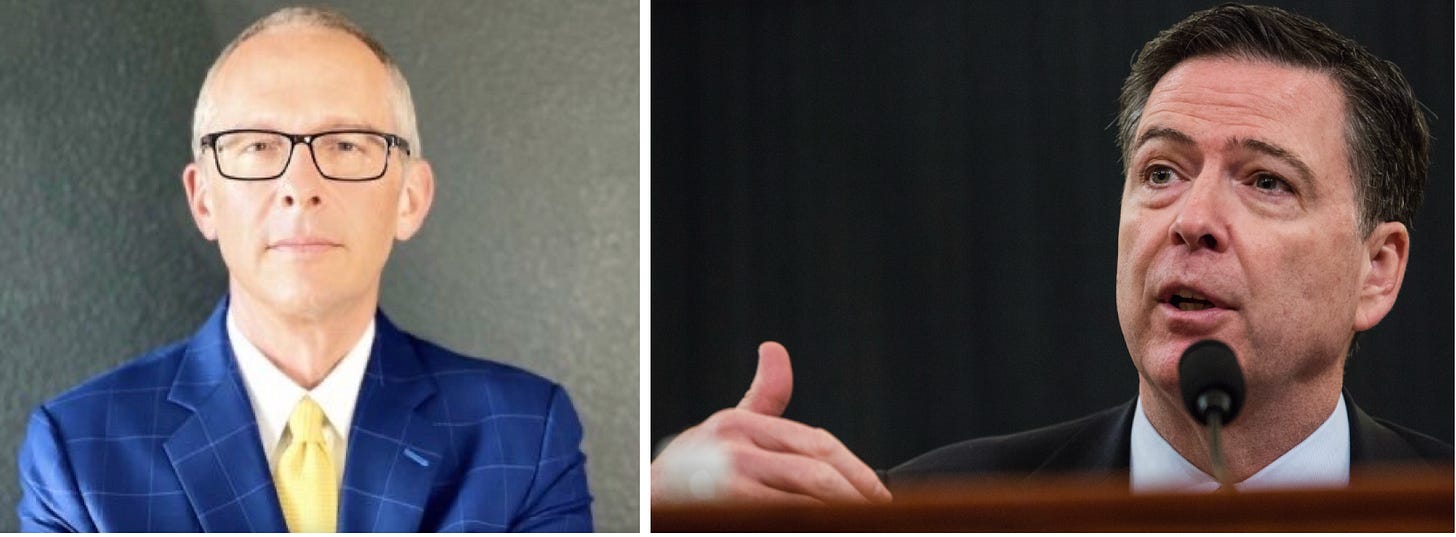
Judicial Watch today announced lawsuits filed against the Department of Justice, the FBI, and the Office of the Director of National Intelligence (ODNI), for failure to respond to Freedom of Information Act requests in the case of longtime Donald Trump adviser Michael Caputo. For those who think Russiagate as ancient history, welcome to its second chapter, about Biden-era surveillance:
Judicial Watch submitted the requests in response to information that Caputo’s email was the subject of a secret search warrant of his Google email account in September 2023, three weeks after he began working for the Trump 2024 presidential campaign…
“The evidence shows that the Biden FBI and Justice Department were spying on the Trump campaign. Caputo used his emails to help devise strategy for the Trump campaign, and the Biden gang was rooting through it all!” said Judicial Watch President Tom Fitton. “The lawsuits show that the lawfare and spying against Trump was only paused. These records can’t be released soon enough.”
Earlier this summer, after FBI Director Kash Patel and Director of National Intelligence Tulsi Gabbard began releasing documents exposing the original Russiagate probe as the product of manipulated intelligence and alleging a “treasonous conspiracy,” critics dismissed the matter as old news. Russiagate never ended for some, however.
Not only did Patel, Deputy Chief of Staff Dan Scavino, and Regulatory Czar Jeff Clark all receive notices informing them of email monitoring from the last election cycle, but at least one longtime Trump aide is still under investigation by the administration he worked to elect.
A notice from Google in March told Caputo he’d been monitored by the FBI since September, 2023, weeks after he agreed to take on “Weaponization of Government” issues for the 2024 Trump campaign. In addition to Patel, Scavino, Clark, and himself, Caputo describes six other colleagues in a similar position. “If I know if there are ten, there are fifty,” says the garrulous Buffalo native with a radio voice. “The one thing I’m sure of is, I don’t know everything.”
Caputo hopes his lawsuit and efforts to get his case closed will jog something loose, from enforcement agencies he still doesn’t trust. “I think Kash and Dan and Tulsi have really big fish to fry,” Caputo says, “But the reason I’m bringing it up now is because my family has had enough. I want them to leave my family alone.”
The devout Catholic who nearly died of cancer during the scandal speaks of the original investigators as a spiritual horror. “These people,” he says, “are demons.”
The nightmare began on March 20, 2017. Caputo was in Moscow of all places, on a trip for his consulting business, staying at the Metropol hotel made famous by Master and Margarita author Mikhail Bulgakov. In the evening, a well-known American reporter called his cell.
“She said, ‘Michael, what the hell is this?’” Caputo recalls. “I said, ‘What do you mean?’ She said, ‘You just got name-checked in a House Intelligence Committee hearing by James Comey for being too close to Russia.’ I asked if she was kidding. She said, ‘I’m not kidding, where are you?’ I said, ‘Why do you need to know?’”
Caputo knew his life was about to be turned upside down. The Trump-Russia controversy was white-hot then. Four intelligence agencies concluded Russia meddled with the 2016 election to help Donald Trump. From there, the heads of anyone with even fleeting ties to Russia began rolling. National Security Adviser Michael Flynn was forced to resign after reported contact with Russian ambassador Sergei Kislyak. Attorney General Jeff Sessions had to recuse himself from Russia matters. And Caputo didn’t know it, but Comey that day just announced the existence of an FBI investigation into Trump’s “links” to Russia in hearings led by California congressman and Russia-hunter-in-chief, Adam Schiff.
Walking outside, Caputo found himself at the foot the Kremlin, a stone’s throw from the Metropol, staring at its red brick. He thought of his family and felt ill. “I lean over with both my hands on the wall, and I vomited all over the wall,” he recalls. “I’m thinking, ‘Oh God, oh God.’ I was retching for two or three minutes.” He got up, tried to clear his head, and ducked into a nearby Western bar to clean himself up. Before he could get to a bathroom, he saw a man at the bar staring at him. “I look at him, and he points at the bar TV. My face is on the TV.”
The critical exchange in Congress involved an exchange between California Congresswoman Jackie Speier and Comey.
“All right, let’s move on to someone else in that web,” the Bay Area’s Speier said. “His name is Michael Caputo. He’s a PR professional, conservative radio talk show host. In 1994, he moved to Russia… In 2000 he worked with Gazprom-Media to improve [President Vladimir] Putin’s image in the United States.” She paused. “Do you know anything about Gazprom, Director?”
“I don’t,” the head of America’s top counterintelligence agency said about the world’s largest natural gas company, and Russia’s largest company. Completing the ignorance loop, Speier incorrectly explained, “Well, it’s an oil company,” then went on.
“What possible reason would the Trump campaign have for hiring Putin’s image consultant? No thoughts on that, Director?”
“No thoughts.”
About Caputo as “Putin’s image consultant”: in Caputo’s defense, Putin at the turn of the century wasn’t a full-blown villain in the American diplomatic community. Ex-Ambassador to Russia and leading Russiagate finger-wagger Michael McFaul at the time lauded Putin as a “bright counter” to the gloomy international picture. Future Canadian Deputy Prime Minister Chrystia Freeland called him a “kindler, gentler sort of Kremlin chief,” welcoming his “quick pat” to her “third-trimester belly.” Even Bill Clinton declared Putin a “man we can do business with.” Only the dwindling independent Russian press absolutely recoiled from him.
Like me, Caputo worked in Russia through the nineties and early 2000s. When we met, he was working on “democratization” projects in the Yeltsin years with USAID-funded organizations like the International Foundation for Electoral Systems, along with groups like the International Republican Institute (IRI), helping launch a Russian version of the “Rock the Vote” campaign.
He was also part of an expensive group U.S. effort to get Yeltsin re-elected, one eventually memorialized in headlines like “Yanks to the Rescue!” in Time and in Hollywood movies like the Jeff Goldblum/Lieb Schrieber vehicle Spinning Boris. “I was part of the original meddling team,” Caputo laughs. He recalls that meetings on that subject were also often attended both by high-level Democrats who’d later become leading Russiagate torch-bearers, and a translator named Konstantin Kilimnik. A 2020 Senate Intelligence Report would later allege that working with Kilimnik was “what collusion looks like.”
Caputo’s life went downhill quickly after that night in Moscow. He and friend Roger Stone would co-earn their own chapter in the report of Special Counsel Robert Mueller, under the heading, “Other Potential Campaign Interest in Russian Hacked Materials.” History unfolded differently, but the header should have read, “FBI Informants Offering Russian Aid to Trump Figures Without Success.”
In May, 2016, months before the official opening of the Trump-Russia investigation, a mysterious stranger named Henry Greenberg approached a partner in his business, Zeppelin Communications, in May of 2016, asking if they would do PR for his restaurant. It turned out he didn’t want PR for his restaurant at all ( it was never built, according to a Miami Herald article), just an introduction to Caputo’s friend Roger Stone. “Henry Greenberg” was really Henry Oknyansky, a.k.a. Gennady Arzhanik, a.k.a. Gennady Vorovtsov, a career criminal who by his own admission was also an informant for both the FBI and the Department of Homeland Security:
A satirist couldn’t have invented this footnote character to the Mueller report. In 1993, while still in Russia, Greenberg-Oknyansky-Vorovstov posed as Gennady Arzhanik, the son of a Soviet war hero, Admiral Vasily Arzhanik. Using this identity, he induced a company called FinInTorg to fork over about $2.7 million for a shipment of canned goods. The moment money was transferred, he swiped it, then fled to America. In a 2002 article, Russia’s Kommersant Daily described him as having been “a fugitive from national and international justice for more than six years,” suspected in the theft of “over $50 million.”
This is the person who asked Caputo to introduce him to Roger Stone, in order to pitch a deal: information about Hillary Clinton laundering money, for $2 million. Stone asked how much money Hillary allegedly laundered. “Hundreds of thousands,” answered Greenberg/Oknyansky. “That isn’t much money,” laughed Stone. Greenberg reportedly said it wasn’t Stone’s money he wanted, but Trump’s. Mueller wrote that Stone “refused the offer, stating that Trump would not pay for opposition research.” The Special Counsel wasn’t impressed with the episode, saying it “did not identify evidence of a connection between the outreach… and Russian interference efforts.”
Mueller left out the detail about Greenberg’s history as a federal informant. Sort-of Russians with vague government or party ties offering dirt on Clinton to Trumpworld figures would be a consistent theme in the scandal. Registered FBI informant Felix Sater suggested that Trump attorney Michael Cohen push for a hotel deal in Moscow. Donald Trump, Jr.’s meeting with Russian lawyer named Natalia Veselnitskaya in search of information on Clinton was “at long last, the smoking gun,” according to the Los Angeles Times, but even NBC’s Ken Dilanian was later forced to consider the episode in a “new light” after it emerged that the information Veselnitskaya offered came from the P.R. firm Clinton hired, Fusion-GPS.
Stefan Halper, another FBI asset, nudged Trumpworld figures like Carter Page with provocative suggestions, like one to seek Russian funding: “I imagine you could probably find funds” and “you could do alright there” and my favorite, “Nobody needs to know exactly where it’s from”:
George Papadopoulos, sold in the papers like the New York Times as the Patient Zero of Russiagate, had an experience similar to Caputo’s. He was approached out of the blue by a mysterious Maltese professor named Josef Mifsud, who made extravagant claims about access to Russian information. Papadopoulos ended up a national villain just for mentioning the story to an Australian diplomat, who quickly fed the story to American authorities, after which the FBI’s “Crossfiure Hurricane” probe was officially announced on July 31, 2016. Like Caputo, Papadopoulos is convinced he was set up, and that only the release of records about American cooperation with foreign governments like our main “Five Eyes” partners (the UK, Australia, New Zealand, and Canada) will clarify who Mifsud was and why he was approached.
“I’m not mad that this has not been revealed yet, because I believe it will be,” Papadopoulos says now. “Recent trips by Gabbard and Patel to the UK and Australia signal that there is momentum towards this transparency.” Sources have told me the Trump administration is indeed making inquiries to some of those countries about older communications involving Russiagate.
When the story of Caputo’s interaction with Greenberg became public, the question the press should have been asking is how and why an FBI informant was trying to sell Trump aides information in May of 2016, or why another FBI informant in Halper was “ingratiating himself” to Page at a London symposium on July 12th, when the FBI investigation didn’t begin until July 31st, ostensibly because of Papadopoulos. Instead, Papadopoulos became a New York Times cover subject, and Caputo and Stone were denounced for failing to mention Greenberg when the House Intelligence Committee asked if he’d been approached by any Russians during the campaign.
California Congressman Eric Swalwell zeroed in on this testimony, telling Yahoo! reporter Michael Isikoff that Caputo and Stone “lied through their teeth,” to “protect the fact that they were willing and eager to take a meeting with Russians” — Russians, plural — “who were offering dirt.” He added Stone was “communicating with individuals associated with the Russian hacks.” There was never evidence that Greenberg had real restaurant plans, let alone connections to Russian intelligence. Asked this week which “individuals” were “associated with Russian hacks” and how he knew that, Swalwell didn’t reply.
In 2019 Caputo — whose wife is Ukrainian — produced a documentary called, “The Ukraine Hoax.” The film, which Caputo insists was a low-budget affair funded via his attorney with “no Russian money for obvious reasons,” was made with a few key points in mind. Though it criticized the Trump impeachment over a call to Ukrainian President Volodymyr Zelensky as baseless, its main message was historical. “I made a movie about how we’re going to go to war and we better watch out,” he says.
The film also dug into the Hunter Biden-Burisma story, with one scene even showing Caputo standing in front of Burisma’s offices. It aired on One America News (OAN) a day after Joe Biden’s inauguration, on January 21, 2021, and is still up on Rumble:
Caputo’s plan was to have the movie run, do a publicity tour, then publish a book. “Covid hit and the plan was scrapped,” says Caputo. The book was eventually published, but in March, 2020, Caputo joined Trump’s government, working for the Department of Health and Human Services as a spokesperson at the outset of the pandemic. Within six months he was diagnosed with head and neck cancer. “Russiagate almost killed me,” he said. “It was 100% stress.”
Caputo stepped away from government. Government didn’t return the favor. On March 16, 2021, a few months into Biden’s presidency, the Director of National Intelligence released a National Intelligence Council report that identified “The Ukraine Hoax” as a product of the Russian Secret Services, by way of Ukrainian parliamentary member Andrei Derkach and the selfsame Kilimnik, with whom Caputo says he never got along, even when they were co-workers at the International Republican Institute in the nineties. “He wouldn’t buy me a drink in a bar in the nineties,” Caputo says. The key passage reads:
Derkach, Kilimnik, and their associates sought to use prominent US persons and media conduits to launder their narratives to US officials and audiences… They also made contact with established US media figures and helped produce a documentary that aired on a US television network in late January 2020.
The next day, March 17, 2021, Radio Free Europe/Radio Liberty identified Caputo as the subject of the report. Neither the NIC nor any of the media treatments explained what the basis was for connecting Caputo’s film and Derkach, Kilimnik, or Russia.
Two years later, considerably thinner but recovered, Caputo decided to re-unite with Trump and join his second re-election campaign. Asked what he’d like to work on, Caputo didn’t hesitate. Stung by the 2016 experience, he sent a memo on August 4th, 2023, headed, “SUBJECT: DIRECTING WEAPONIZATION REFORM.” He wrote to the campaign leadership:
This memorandum outlines a campaign strategy to develop and execute federal government reform policy, focused on transformation of the Department of Justice (DOJ), the Federal Bureau of Investigation (FBI), the Department of Health and Human Services (HHS), and more.
Five weeks later, on August 21, 2023, the U.S. Attorney’s office in the District of Columbia issued a classified subpoena to Google, demanding access to Caputo’s emails, subscriber information, billing and finacial information (including Google wallet), VOIP calls, data transfer volumes, and other records. He didn’t find out about this until March 18, 2025. In another preposterous plot-twist, he was by that time himself an advisor to the new U.S. Attorney of the District of Columbia, Ed Martin.
“I actually was notified that this was an investigation initiated by the US attorney in the District of Columbia while sitting in the office of the US Attorney for the District of Columbia,” he recalls.
The classification on Caputo’s subpoena tolled, so like Patel, Scavino, and Clark, Caputo received a notice from the company informing him his data had been collected.
Across the years, a huge range of people connected to Russiagate received similar notices. Congressional investigators on both sides of the scandal were monitored in leak investigations, from Senate staff looking into Russiagate’s origins like former Judiciary Committee Counsel Jason Foster to members of Congress like Swalwell and Adam Schiff, who were pushing the probe in the opposite direction. Mueller targets like Rick Gates, too, received Google notices post-factum, and figures like Page and Paul Manafort were monitored under FISA.
Even Tucker Carlson appeared victim to the not-uncommon Russiagate cocktail of “incidental” FISA collection and media leaks, when Axios in 2021 reported he was “talking to U.S.-based Kremlin intermediaries about setting up an interview with Vladimir Putin.” The amusing source: “People familiar with the conversations.” A later story by Charlie Savage of the New York Times hypothesized that the NSA “may have incidentally” captured his conversations without “intentionally targeting him as part of any nefarious plot.” Savage didn’t hypothesize about the intentionality or nefariousness of the leak.
“It was definitely part of Russiagate,” Carlson says. “The NSA read my texts and leaked the details to the New York Times. Ultimately they admitted it, but no one was ever punished. I rarely think about it, but it infuriates me every time I do.”
Since Russiagate started it’s become common to learn that intelligence agencies were either intentionally or incidentally collecting information even on politicians. A December, 2021 Inspector General’s report quietly disclosed in a footnote that a U.S. Congressman was the subject of “overly broad” and “non-compliant” FISA searches (it turned out to be Illinois Republican Darin LaHood). Current Director of National Intelligence Tulsi Gabbard was physically monitored by Air Marshals under the TSA’s Quiet Skies program. The New York Times even just reported that the leak case involving John Bolton involved communications captured by a Five Eyes ally in the Biden years. Who isn’t under surveillance now?
Caputo’s notice read, saying, “Hello, Google received and responded to a legal process issued by the Federal Bureau of Investigation”:
In conjunction with news about other Google notices, he lost it. “Come on,” he says. “The future Director of the FBI? Dan Scavino, the one of the President’s best friends, and the member of the campaign? Me, a member of the campaign, and they popped me weeks after I send a memo on how to pursue a Weaponization of Government policy? That’s a huge mop-up operation.”
Caputo turned to Judicial Watch, which filed FOIA requests to the DOJ, FBI, and ODNI, asking for records of his case. All were ignored, prompting the lawsuits filed today. He worries that elements of the FBI and other agencies who brought the original cases are still in place, using spy tools far too easy to access, with too little oversight. The only thing that would even begin to justify any of this would be evidence of Russian money backing his movie, but Caputo is steadfast on that score. “It’s been four and a half years by now,” he says. “You think they’d have found some kind of Oleg.”
Fifty years after Watergate, the idea of spying on aides to presidential candidates, Congressional staff, journalists, even candidates and presidents no longer shocks much of the country. Can that pattern be reversed?

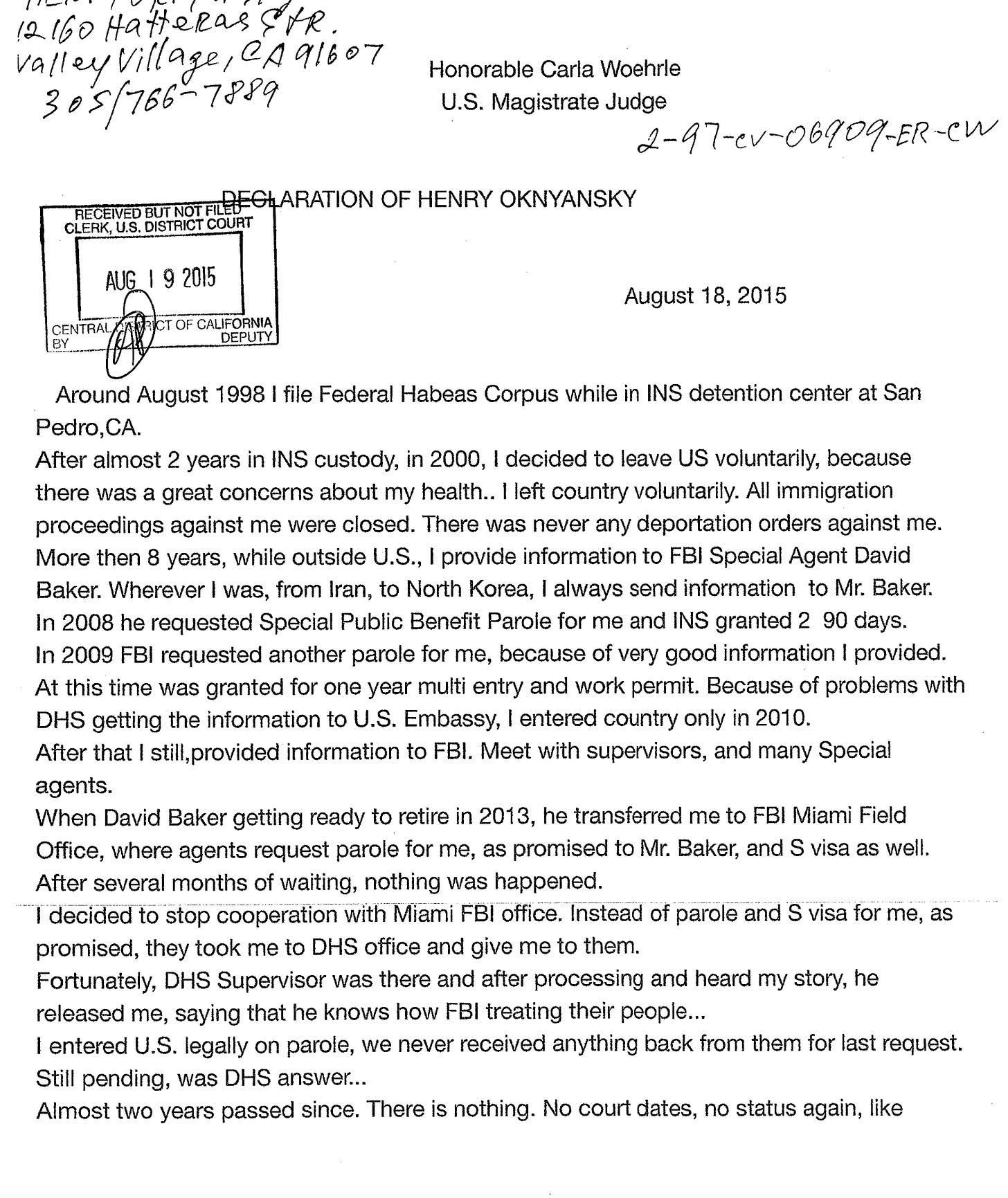
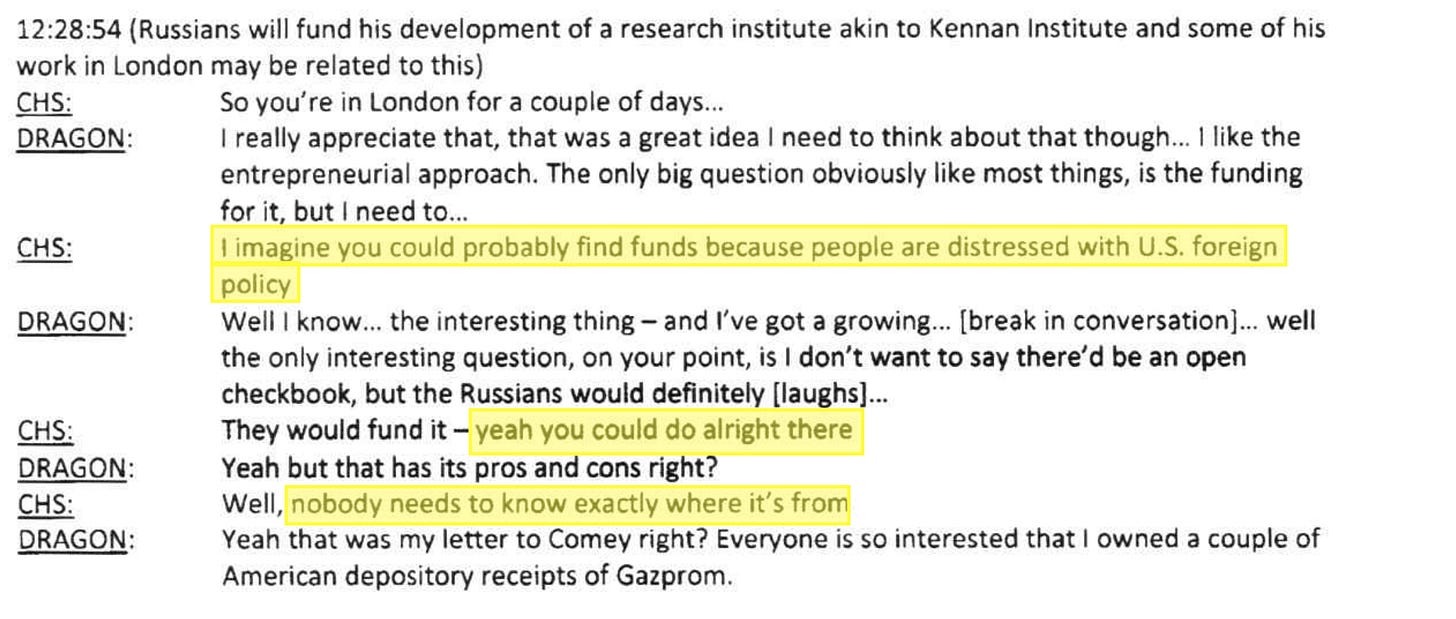
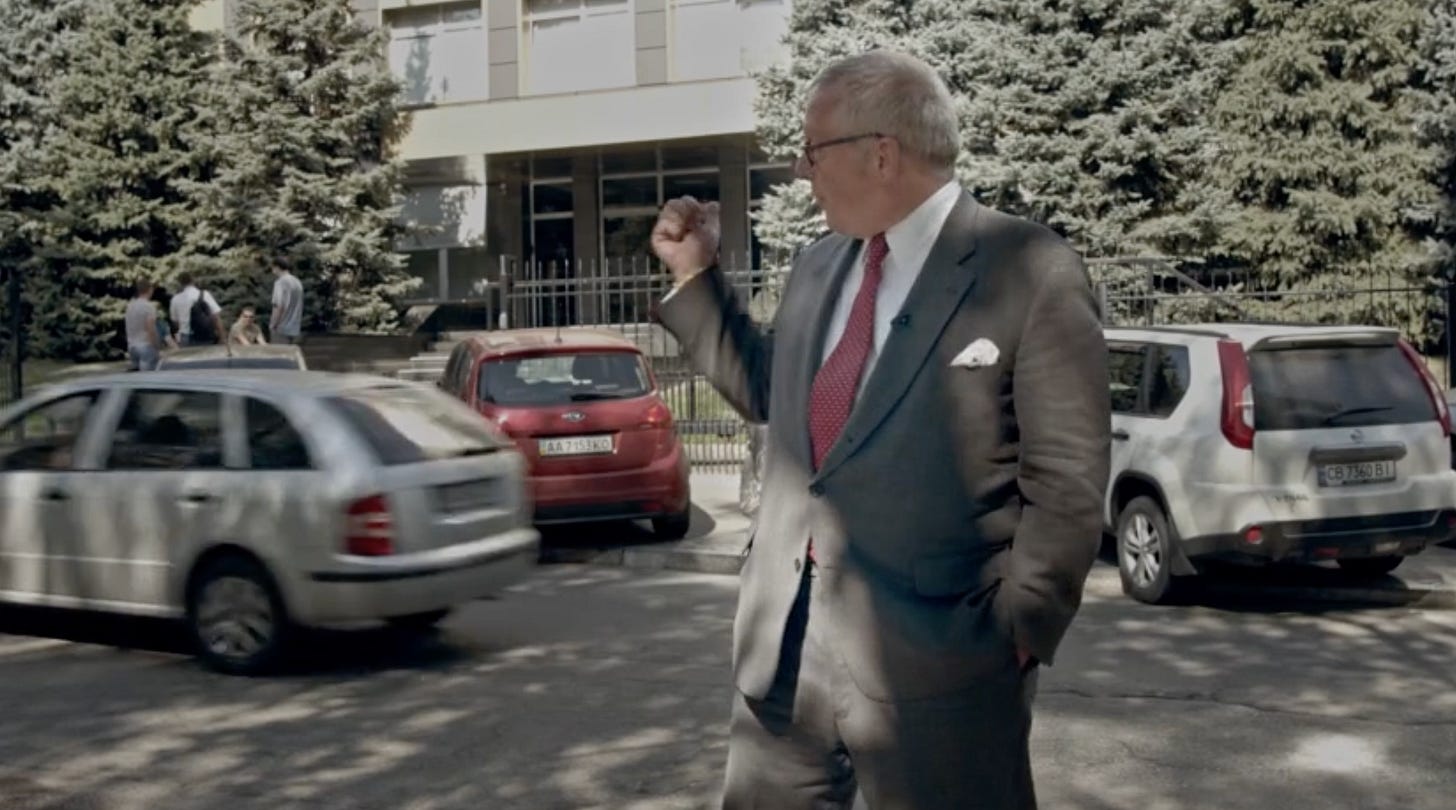
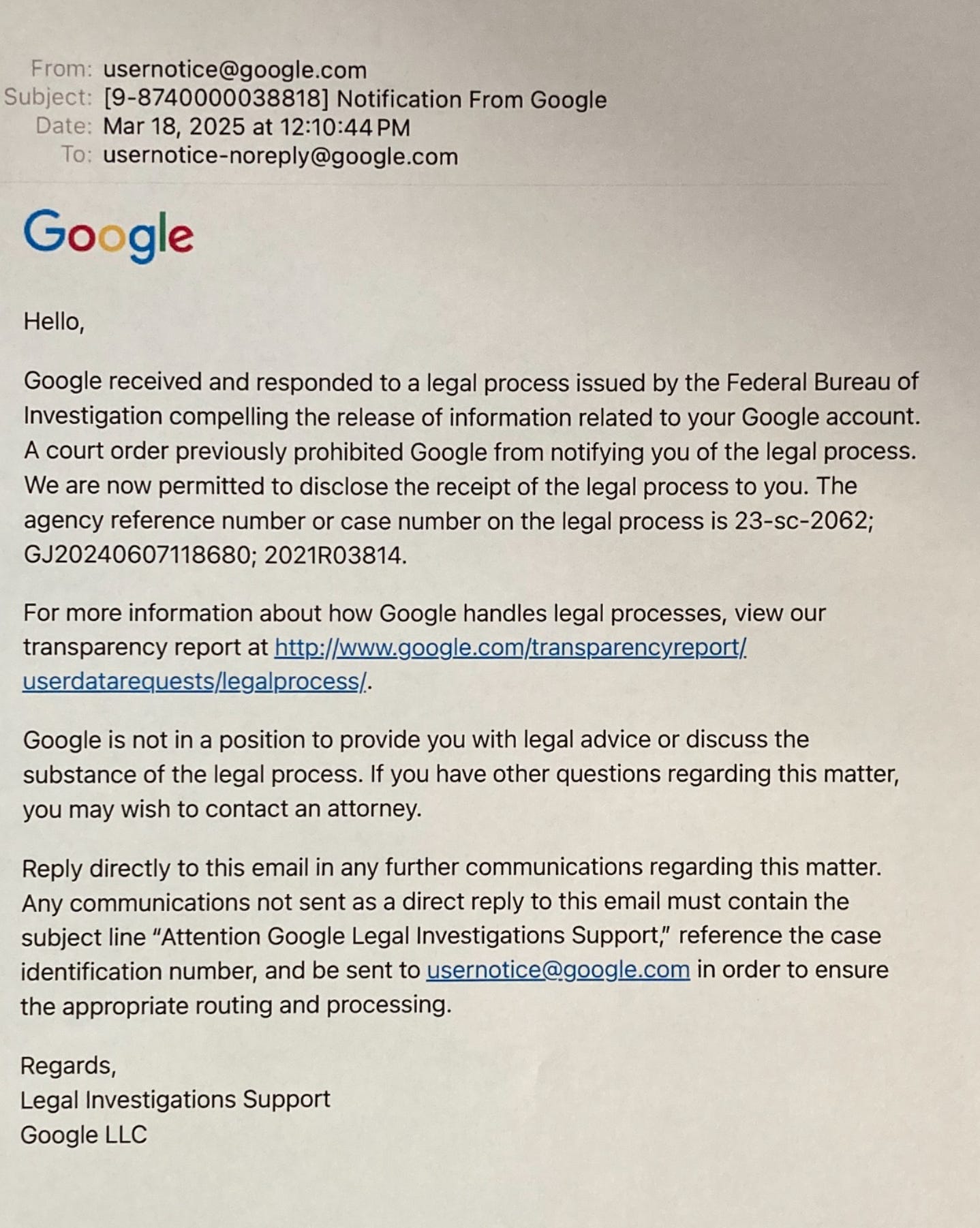
Watergate was the first deep state coup. Bob Woodward was an intelligence asset that used an allied MSM platform. Nixon and Trump did nothing wrong, but Watergate set the precedent for Russiagate and half a century of rule by the uniparty swamp.
Still believe our “security services” should be razed to the ground. They are a clear and present (and future) threat to the American people.